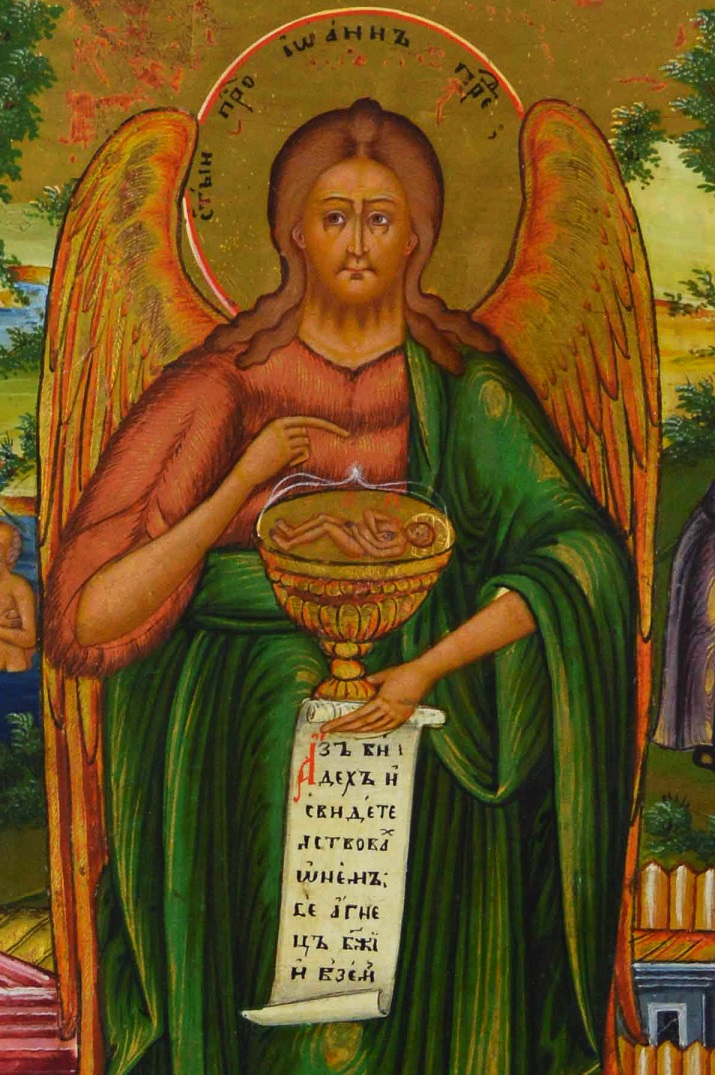In St John the Forerunner, today’s feast celebrated a unique figure.
As the seal of the prophets of the Old Covenant and the herald of the Messiah and His New Covenant, he looks back to the Judaic world of the Old Testament and forward to the new age of Faith, manifest in the life of Christ, the preaching of the Gospel and the foundation of the Church as the New Israel.

St John stood on a boundary between the old and the new, as a wild and challenging figure, living in a manner similar to some of his Jewish contemporaries living an ascetical lifestyle, but is unique in the mission and meaning of that unconventional life: “The voice of one crying out in the wilderness: ‘Prepare the way of the Lord, make his paths straight.’ ”
He was not an easy figure, but challenging, unabashed in his preaching, saying things that some did not want to hear. To recall this today is striking at a time of crisis in eastern Europe, when voices ‘in the wilderness’ are silent, and Church leaders fail to speak in the spirit of the Forerunner and call Herod to account.
As we celebrate his Nativity, we might well ask, where is the spirit of the Forerunner, not only in the Church, but also in our own lives and communities?
When Christianity becomes respectable and institutionalised, the flame is dying, and the lukewarmness of user-friendly, easy faith is an ersatz imitation of the challenging edginess that Christianity should always have for us.
When the zeal of Faith becomes dissolved in middle-class ‘niceness’ and suburban respectability, when Christianity should have ‘bite’ and challenge us all to be ‘spiritual activists’ struggling to storm the Kingdom of Heaven, we are far from the spiritual zeal of the Forerunner.
This does not mean that we should be catapulted into political-activism and placard-carrying protest, but rather that we should personally embody the radical message of the Gospel, which is counter-cultural in the materialistic and anthropocentric darkness of the current age, gripped by the idols of self, wealth, health, ‘efficiency’ (reflected in the normalisation of abortion, euthanasia, surveillance, government erosion of freedom of expression etc.), let alone the moral and spiritual bankruptcy of those who rule and make such major decisions in the world.
Faith must have a voice in this darkness as traditional Christians are labelled bigots, reactionaries and medievalists by both secularists and self-proclaimed ‘Christians’ who have willingly and gladly embraced the agendas, causes and -isms of the fallen world, as authentic Christianity is forced into the shadows, and the warm, but deadly glow of a vague and ambiguous ‘religious’ universalism replaces Christ-the Cornerstone.
As the Forerunner’s life and death teach us, this voice has a cost – possibly a very great cost.
This was the cost paid by the martyrs, among whom we hold both St John and his righteous father Zacharias, who was “murdered between the Temple and the altar.” St Gabriel Ugrebadze paid this cost by being incarcerated by the Soviets and injected with chemicals. St Maria of Paris paid this cost by being arrested by the Nazis and incarcerated in Ravensbruck, where she met her death in the gas-chamber; the martyred Father Daniel Sysoev paid this price when he was slain in his own temple by Islamists.
Even as Christians claiming the fullness of the Faith in a Church which rejects compromise, and the dangers of modernism, today’s feast is a challenge to each of us, but as we celebrate the Forerunners memory, are we ready and would we be prepared to pay the price for being a voice in the current wilderness preaching the Truth of Faith – Truth which may be dangerous and costly ?
This is a challenge for each of us – perhaps an uncomfortable one for most of us – but a challenge we must embrace.
